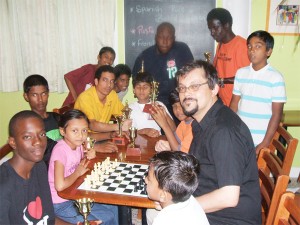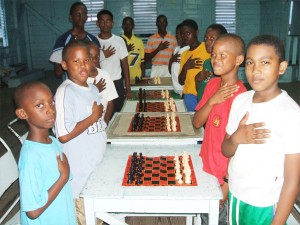Suddenly, almost overnight some would say, India and China have emerged from chess obscurity to sit among the giants of the great game.

The Russians had dominated the game, beginning in 1927 when Alekhine wrested the championship title away from Cuba’s José Capablanca. Every world champion came from the Soviet Union. The Russian hegemony seemed unbreakable.
In the 1960s, however, Fischer appeared, an American lone ranger of chess. Instantly, he gained the prominence of a Socrates among the Russians with his monumental book knowledge, his ability to calculate deeply and without error, his immaculate technique, his dependable memory, his effortless and thoroughly rehearsed systems and most of all, his sheer determination to be the best. Fischer, singlehandedly, shattered the unbreakable Soviet hegemony over the ancient game by capturing the world championship title or chess’s holy grail.
In the eighties and nineties, India and China began playing serious chess.
Both nations realized it was a ‘system’ that had put the Soviets in such a commanding position. No other country had established a school of chess, nursing talent and providing material comfort for its leading players.

In the pre-revolutionary days, chess in Russia operated like chess anywhere in the world. Players made it on their own or did not make it at all. After the revolution, however, chess became more than a game or sport; it became a socio-cultural manifestation similar to drama, literature and music. An apparatus was set up, and efforts were made to create a mass movement for the game. Leading players gave lectures, exhibitions and classroom instruction. Clubs were formed and the movement was given wide publicity.
India has since established a prominent school of chess, which I believe has been principally responsible for the increase in the number of titled players emerging from the country. Recently, India captured both the Boys and Girls World Junior Championship titles. Not only that. They also captured the runners-up places in both categories. Similarly China, today, has some of the highest ranked grandmasters on the international circuit.
In Guyana, I believe we can learn and gain from the experiences of Russia, India and China. When I think about it, I believe we can produce, perhaps, the first grandmaster from the English-speaking Caribbean. I believe we can nurture, and create a player of international consequence from among our young people.
More kids are playing the game now than before. We have to develop their talent and I have an idea of how we can do it. Next week I will share those thoughts with you.
Demerara Distillers Limited, under its Topco range of fruit juices, is sponsoring the Carifesta eight round swiss system chess tournament for junior and senior players countrywide at the Kei-Shar’s Sports Club in Hadfield and Camp Streets. Play begins sharply at 10 am. Participants for today’s tournament are asked to respect the start time since four games are to be completed today. The remaining four games will be played next Sunday.







